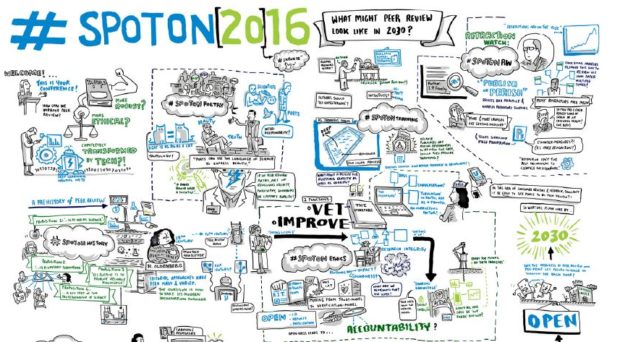
Peer review presents one of the greatest opportunities, and challenges, in advancing discovery. Various methods of peer review have been in existence for the last 350 years, but only formally used by journals since the 1960s. Despite all its perceived flaws — that it can be slow, inefficient, biased and open to abuse — peer review retains its pivotal role in validating research results, typically prior to, but also post, publication.
While there have been a number of advances in peer review in recent times — including new models and improvements to existing systems — truly transformative change has not been widely adopted.
In November 2016, SpotOn London asked ‘What might peer review look like in 2030?’ with a one-day conference at the Wellcome Collection, hosted by BioMed Central and Digital Science, and sponsored by River Valley Technologies. The aim was to bring together individuals across various communities including research, publishing, funding, communications, technology and policy to collaborate on feasible and innovative ways to improve peer review.
Can technology make peer review faster and easier? Will increased transparency make peer review more ethical? Should there be provision for training in peer review? How will the increasing presence and importance of preprint servers impact on peer review and publishing? Will crowdsourcing make the process of inviting peer reviewers more elective? Will advances in artificial intelligence make the future entirely peer-less? Is there a role for the living article? How could we recognize the work peer reviewers do?
These issues (and many others) were discussed on the day, and developments in six key areas are shared in this report. We hope that you will find the perspectives contained within this report, from publishers, a researcher, a librarian and others, informative and thought-provoking.
In reflecting on the themes presented here, particularly in a climate of ever-increasing research output, it is clear that the publishing and peer review landscape will continue to evolve, and perhaps more rapidly than it has in the past.
At BMC we introduced open peer review in 1999, and we continue to experiment with new models such as results-free peer review. We are still exploring ways in which we can improve the process of peer review, and in some cases, affect radical change to methods, processes and supporting systems. But of course we are not the only ones, and publishers will have to proactively partner with the wider community if we are to see real industry-wide improvements.
Our recommendations as we head towards 2030 are that the
research community:
- Find and invent new ways of identifying, verifying and inviting peer reviewers, focusing on closely matching expertise with the research being reviewed to increase uptake. Artificial intelligence could be a valuable tool in this.
- Encourage more diversity in the reviewer pool (including early career researchers, researchers from different regions, and women). Publishers in particular could raise awareness and investigate new ways of sourcing female peer reviewers.
- Experiment with different and new models of peer review, particularly those that increase transparency.
- Invest in reviewer training programs to make sure that the next generation of reviewers are equipped to provide valuable feedback within recognized guidelines.
- Work towards cross-publisher solutions that improve efficiencyand benefit all stakeholders. Portable peer review has not taken off at any scale, but could make the publishing process more efficient for all involved.
- That funders, institutions and publishers must work together to identify ways to recognize reviewers and acknowledge their work.
- Use technology to support and enhance the peer review process, including finding automated ways to identify inconsistencies that are difficult for reviewers to spot.
We want to start a conversation with the ambitious aim of ultimately improving peer review for millions of working academics.
We’re calling on the research community to take part and take on the challenge.
Whether you’re a frustrated scientist, a peer reviewer, an editor, a publisher or a librarian, we would love to hear your views. Tweet us using #SpotOnReport, email us (spoton@biomedcentral.com) or comment online. And we hope to see you at #SpotOn17.
Read the full report from SpotOn 2016 here.
Comments